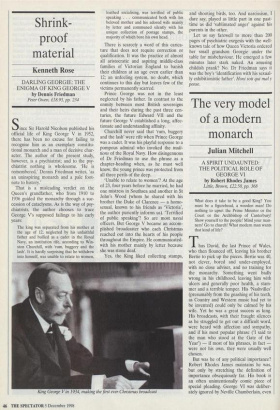Shrink-
proof material
Kenneth Rose
DARLING GEORGIE: THE ENIGMA OF KING GEORGE V by Dennis Friedman Peter Owen, £18.95, pp. 234 Since Sir Harold Nicolson published his official life of King George V in 1952, there has been no excuse for failing to recognise him as an exemplary constitu- tional monarch and a man of decisive char- acter. The author of the present study, however, is a psychiatrist; and to the psy- chiatrist nothing is wholesome. 'He is remembered,' Dennis Friedman writes, 'as an uninspiring monarch and a pale foot- note to history.'
That is a misleading verdict on the Queen's grandfather, who from 1910 to 1936 guided the monarchy through a suc- cession of cataclysms. As is the way of psy- chiatrists, the author chooses to trace George V's supposed failings to his early years:
The king was separated from his mother at the age of 12, neglected by his unfaithful father and bullied as a cadet in the Royal Navy, an institution rife, according to Win- ston Churchill, with 'rum, buggery and the lash'. It is hardly surprising that he withdrew into himself, was unable to relate to women, loathed socialising, was terrified of public speaking . . . communicated both with his beloved mother and his adored wife mainly by letter and communed silently with his unique collection of postage stamps, the majority of which bore his own head.
There is scarcely a word of this carica- ture that does not require correction or qualification. It was the practice of almost all aristocratic and aspiring middle-class families of Victorian England to banish their children at an age even earlier than 12; an unfeeling system, no doubt, which continues to this day but leaves few of the victims permanently scarred.
Prince George was not in the least neglected by his father. In contrast to the enmity between most British sovereigns and their heirs during the past three cen- turies, the future Edward VII and the future George V established a long, affec- tionate and understanding affinity.
Churchill never said that 'rum, buggery and the lash' were rife when Prince George was a cadet. It was his playful response to a pompous admiral who invoked the tradi- tions of the Royal Navy. How disingenuous of Dr Friedman to use the phrase as a chapter-heading when, as he must well know, the young prince was protected from all three perils of the deep.
`Unable to relate to women'? At the age of 23, four years before he married, he had one mistress in Southsea and another in St John's Wood (whom he shared with his brother the Duke of Clarence — a homo- sexual, known to his friends as 'Victoria', the author puriently informs us). 'Terrified of public speaking'? So are most naval officers. But George V became an accom- plished broadcaster who each Christmas reached out into the hearts of his people throughout the Empire. He communicated- with his mother mainly by letter because she was stone deaf.
Yes, the King liked collecting stamps, King George V in 1934, making the first ever Christmas broadcast and shooting birds, too. And narcissism, I dare say, played as little part in one past- time as did 'sublimated anger' against his parents in the other.
Let us say farewell to more than 200 pages of psychiatric exegesis with the well- known tale of how Queen Victoria ordered her small grandson Georgie under the table for misbehaviour. He emerged a few minutes later stark naked. An amusing childish prank? No. Dr Friedman says it was the boy's 'identification with his sexual- ly exhibitionistic father'. Honi soit qui mal y pense.


















































































 Previous page
Previous page